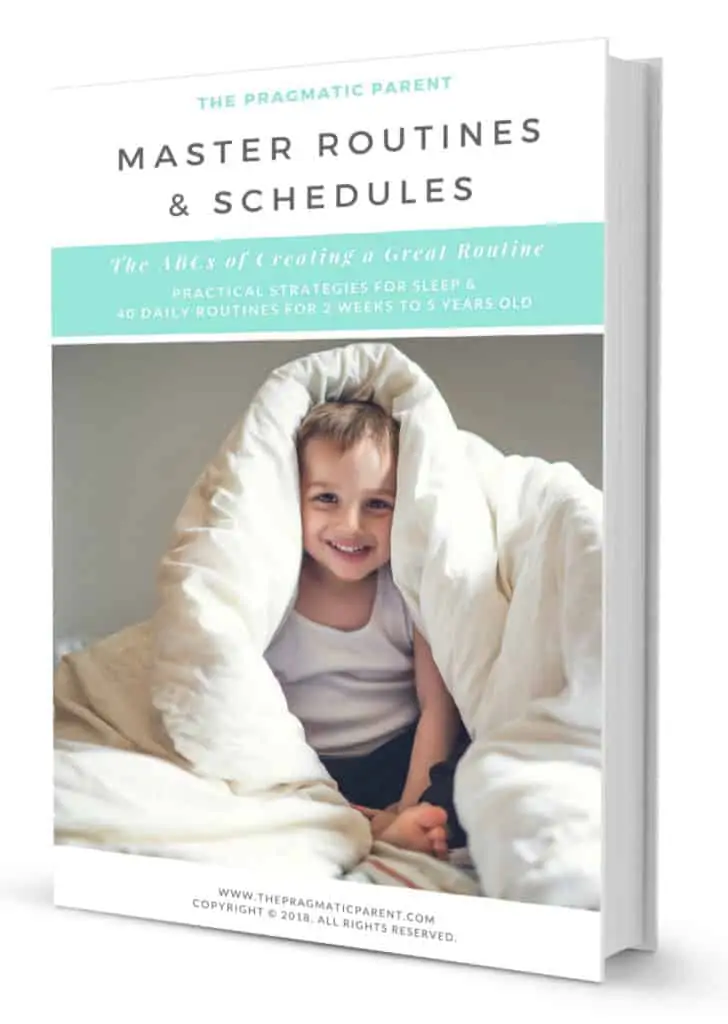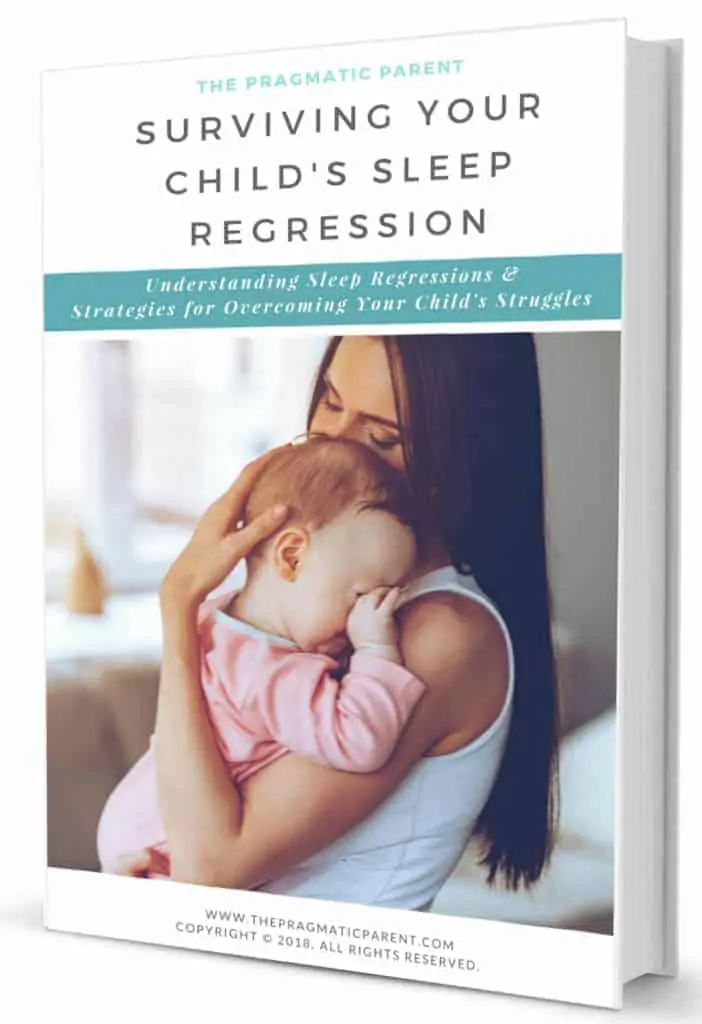When your child stops sleeping, fights naps and wakes up frequently you may be asking – is this a sleep regression? What now? Get the details on surviving each baby sleep regression including the 6 week sleep regression, 4 month sleep regression, 8 month sleep regression, 18 month sleep regression and 2 year sleep regression!
Understanding Sleep Regressions: An Overview
Okay, let me tell you something I’ve learned first-hand—navigating sleep regressions from the cozy womb days right up to the defiant toddler bed battles is a journey that can leave you asking, “Why isn’t my baby sleeping?” or better yet, “Why does my toddler think bedtime is optional now?”
Yes, I’m talking about the whole gambit—starting from the 6 week baby sleep regression to the 4 months sleep regression, shimmying past the 6 and 8 month sleep regressions, right into the thick of the 18 month and two year sleep regression.
Each of these sleep disturbances is like a rite of passage, marked by milestones and developmental leaps.
You know, those moments when your baby suddenly understands that skipping naps is an option or your toddler realizes they have a will of their own.
And each time, we’re left baffled, bedtime routine in shambles, wondering how to get our bundle of joy to dreamland.
But here’s the silver lining—the chaos isn’t without reason.
The most common questions I receive about sleep regressions are:
- How long do sleep regressions last?
- What do we do if my child is going through a sleep regression?
- If my child is sleeping through the night, do I need to worry about sleep regressions?
- How do I prevent bad habits from forming during this time?
Before we dig into answering these common questions about sleep regressions, first, let’s talk about what a sleep regression is and when they are most likely to occur.
Each sleep regression is tied to remarkable growth spurts, be it mastering new motor skills, grappling with separation anxiety, or blossoming social and language skills that have our tiny humans too wired to shut down.
If You’re in a Hurry or Looking for Quick Sleep Regression Wins…
What is a Sleep Regression?
A sleep regression is when your baby, who was previously sleeping well, possibly even through the night, suddenly stops napping, fighting sleep times, and waking more frequently. Essentially, sleep goes out the window and chaos starts, without any known cause (such as traveling, teething, change in routine, etc.)
One way to think of a sleep regression, is that it’s not actually regression at all, but a sign of their progressing development. These important parts of her growth signal your baby approaching a developmental milestone, which just happen to affect your baby’s sleep.
Cognitive milestones (aka neurological milestones) are critical periods of development which change a baby’s perception of the world, as outlined in the book The Wonder Weeks. This may be their perception of distance from you (the distance between you and her when you walk away or move further away) and object permanence (separation anxiety.)
Physical milestones are developmental leaps which including standing, crawling, babbling, sitting, clapping hands, walking, cruising and rolling.
Babies process these giant leaps during periods of sleep, which means that it becomes common for them to wake more often during REM sleep as they experience these milestones.
Of course, it’s always important to rule out any medical issues with development or a food allergy, but if you rule these reasons out for the changes to your baby’s sleep, then focus on your baby’s new skills and leaps in development. Is your baby more clingy with you or your partner, learning new skills, or gets easily upset when you leave the room?
How Long Does a Sleep Regression Last?
Typically, a sleep regression can last anywhere from 2 weeks to 6 weeks, most averaging around 3-4 weeks in length. Most sleep regressions tend to happen at major cognitive and developmental milestones.
Don’t worry, most children don’t hit each of these sleep regression ages, and some don’t hit any of them. If they do hit a sleep regression; take a deep breathe, load up on coffee and know it’s completely normal, common and it will pass.
The Journey Through Sleep: 6 Week and 4 Month and Sleep Regressions
Ever found yourself frantically searching google desperately into the night, “Why has my baby suddenly stopped sleeping?”
It’s like one day, our little bundle of joy is sleeping peacefully, and the next, it’s as if every nap and nighttime sleep is a battle.
Believe me, you’re not alone on this rollercoaster. First up is the 6-week sleep regression, a sneak peek of sorts into the tumultuous world of baby sleep patterns, often marked by a baby not sleeping due to growth spurts and the vast, new world they’re just beginning to sense.
Fast forward to the 4 month sleep regression, and it’s like we’ve hit a major developmental milestone where their sleep cycles shift dramatically, waking more frequently and finding it hard to drift back off. This isn’t just about our little one skipping naps or our toddler not sleeping; it’s a monumental developmental leap.
So, how do we ride this wave?
Adjusting our routines can be a lifesaver.
Maybe it’s about sticking closer to nap times or introducing a consistent bedtime routine to give them the cues their bodies crave. For many of us, this phase feels endlessly long, but with a few tweaks here and there, we’ll find our way through the sleepless nights, reminding ourselves, this too shall pass.
Tips for the Early Stages: 6 Weeks and 4 Months
- Revise the day-sleep pattern:Should your infant start skipping naps or show signs of restlessness during daylight hours, think about fine-tuning their daytime sleep schedule to alleviate the challenges of the 4 month sleep regression.
- Incorporate calming pre-sleep routines:Establish a serene nighttime ritual that might include a soothing bath, a gentle rub, or quiet songs to signal the end of the day, which is crucial for both the 6 week and 4 month sleep regression phases.
- Promote independent sleep:Gradually encourage your baby to fall asleep on their own by placing them in their crib when they’re sleepy but not yet asleep, aiding them in navigating baby not sleeping issues more smoothly.
Specific Tips for the 4 Month Sleep Regression Phase
- Stay consistent with bedtime: Despite the challenges of the 4 month sleep regression, aim to keep bedtime consistent to provide a sense of security and routine.
- Be patient and flexible: Remember, the 4 month sleep regression is a phase. It’s okay to be flexible with how you handle baby not sleeping through the night, and patience will be your best ally.
The 6 Month Milestone & Sleep Regression
When I hit the 6-month mark with my twins, I was hardly prepared for the onslaught of sleep disturbances that came our way.
Suddenly, my babies, who had been sleeping relatively well, was now experiencing what I learned to be the 6 month sleep regression. It wasn’t just a matter of being a baby not sleeping through the night anymore; this was next-level.
The leap in development at this stage, including burgeoning mobility and the onset of separation anxiety, wreaked havoc on our nights. Babies are starting to roll over, maybe even attempting to crawl, and they’re realizing that, hey, when mom or dad leaves the room, they’re actually gone.
Cue the tears and nighttime awakenings.
Attempting to adapt our bedtime routines was key.
I found that incorporating a more defined wind-down process helped signal to my little one that sleep was on the horizon. This included quiet activities, a warm bath, and soothing music.
The aim was to make the transition to sleep as calm and reassuring as possible, especially for a little being grappling with the newfound anxiety of separation. I also learned the hard way that consistency was my best friend during this time.
Sticking to a routine, even when it seemed futile, eventually paid off, offering my baby the predictability they needed to navigate through this sleep regression phase.
Managing the 6 Month Regression
- Establish a calming bedtime routine: Incorporate soothing activities like a warm bath, gentle massage, or soft music to signal to your baby that it’s time to wind down for sleep. This predictability helps ease separation anxiety.
- Practice patience-stretching: Gradually increase the time you’re out of your baby’s sight to help them get used to being alone for short periods. This can build their confidence and ability to sleep independently.
- Create a snug sleep environment: A cozy, womb-like space can make your baby feel more secure. Consider using a swaddle or baby sleeping bag that’s appropriate for their age.
- Keep a favorite comforting item nearby: Whether it’s a soft blanket or a favorite plush toy, having a familiar object can provide comfort to your baby when you’re not in the room.
- Stay consistent with naps: Skipping naps can lead to overtiredness, making the 6 month sleep regression worse. Keep a consistent nap schedule to ensure your baby isn’t too tired at bedtime.
Facing the 8 Month Sleep Regression Hurdle
Oh, you’ve hit the 8-month mark, and suddenly, it feels like all those beautifully crafted sleep routines are teetering on the edge of extinction.
It’s not your imagination; you’re smack in the middle of the 8 month sleep regression, and let me tell you, it’s a game-changer.
This phase is all about your little one’s skyrocketing development — they’re learning, exploring, and frankly, becoming little geniuses that can’t seem to shut off their brains, even when it’s bedtime.
Baby not sleeping? It’s because every waking moment is an opportunity to master new skills, and who wants to miss out on that, right?
But here’s the thing, navigating this sleep regression without spiraling into a world of endless coffee and under-eye bags is all about consistency.
You’ve got to maintain that bedtime routine like it’s your job because, well, right now, it kind of is.
Amidst the chaos of newfound abilities and the inevitable toddler not sleeping phase, your steadiness is the beacon that guides them back to dreamland, night after night.
So, buckle up, brew some patience (you’ll need it more than caffeine), and remember, this too shall pass.
Conquering the 8 Month Regression
- Keep bedtime routines sacred: Sticking to a consistent bedtime routine can be a north star through the restless sea of the 8 month sleep regression. Whether it’s a bath, story, or lullaby, this ritual becomes a cue for sleep that’s comforting amidst their fast-changing world.
- Encourage day time exploration: At 8 months, babies are becoming little explorers. Encouraging play and discovery during the day helps them satisfy their curiosity, making them more likely to rest at night. Think of it as using up their energy for good!
- Adjust nap schedules thoughtfully: If your baby is skipping naps or finding it hard to settle, it might be time to tweak their nap routine. Sometimes, shifting times or shortening naps can help maintain a better balance for nighttime sleep.
- Stay calm and patient: When your baby is not sleeping, it’s easy for us to feel frustrated. Remember, this phase is just a phase. Keeping your cool and offering comfort is key, even when the night feels endless.
The 18 Month Sleep Regression Shift
Just when you thought you had this whole baby not sleeping puzzle sorted, along comes the 18 month sleep regression, turning your toddler’s bedtime into a battleground. What’s going on here?
Well, it’s a mix of increased independence, a blossoming personality, and, yes, more teething.
They’re learning to say ‘no’, testing boundaries, and for some reason, deciding that skipping naps is the new trend. I get it, it’s tough. You’re juggling the need to support their newfound autonomy while also wanting to ensure they get enough shut-eye.
The key?
Setting limits and being consistent. It’s like they have an internal radar for inconsistency, and trust me, they will test it. Establishing a routine at this stage is as crucial as ever, yet flexibility remains your best tool in the parenting toolbox.
Yes, it’s a delicate balance, but one that can ensure your toddler, and you, make it through this phase relatively unscathed.
Strategies for 18 Months
- Stick to a Routine: Like clockwork, maintain a consistent bedtime and nap schedule. It’s tempting to let the day dictate nap times, but consistency is your best friend during the 18 month sleep regression.
- Limit Bedtime Battles: Pick your battles wisely. If your toddler insists on a specific pajama or bedtime story, it might be easier to go with the flow, provided it doesn’t disrupt the sleep routine.
- Ensure Daytime Activity: Engage them in plenty of daytime activities. At 18 months, their growing independence and energy levels need an outlet. Tired toddlers are more likely to fall asleep without much fuss.
- Revisit Nap Times: Sometimes, the issue is too much or too little daytime sleep. If they’re skipping naps or napping too long, it might be time to adjust.
- Comfort and Reassurance: Separation anxiety can peak around this age. A little extra cuddle time before bed can provide the security they need to sleep better.
- Communicate About Sleep: Even at 18 months, toddlers understand more than we give them credit for. Talk about the importance of sleep in a way they can understand, and encourage their cooperation.
The Two Year Sleep Regression
When we hit the two-year mark, it feels like we’ve just about got this sleep thing down, right?
Then comes the two year sleep regression, throwing us for a loop when our toddler’s once predictable sleep patterns take a nosedive.
Why? Well, it’s a combo of their blossoming imagination leading to vivid dreams and a spike in their social and language skills. Suddenly, your toddler’s mind is racing at bedtime, filled with thoughts and maybe even fears they didn’t have before.
What’s a sleep-deprived parent to do?
Talking about bedtime fears becomes our go-to strategy, making space for those little worries and wonders that fill their big imaginations. It’s about normalizing these fears while assuring them that they’re safe.
This phase, with all its challenges, including baby not sleeping, toddler not sleeping, and what feels like endless nights of skipping naps, is just that—a phase. And like all the ones before, we’ll navigate this together, finding our way back to restful nights.
Tips for Managing Two Year Sleep Challenges
- Stick to a consistent bedtime ritual, even when it feels like your toddler is resisting sleep more than ever. This familiarity can be incredibly reassuring during a phase filled with big developmental leaps.
- Address fears with patience and reassurance, because let’s face it, the two year sleep regression often comes hand-in-hand with vivid dreams and an imagination that’s just kicked into overdrive.
- Keep daytime activities balanced, ensuring there’s a healthy mix of play, rest, and quiet time. Toddlers not sleeping through the night often need this careful balancing act to avoid becoming overtired or overly stimulated.
- Encourage the use of a comfort object, like a soft blanket or a favorite stuffed animal. This can provide an extra layer of security for your little one once the lights go out.
- Be prepared for some nap resistance, but don’t give up on them entirely. Adjusting nap schedules can sometimes help smooth over bumps caused by the two-year sleep regression.
General Tips to Help You Through All Sleep Regressions Stages
Navigating the twisty path from the blissful dream of a new baby sleeping peacefully to the first time your toddler decides that sleep is, in fact, for the weak can feel akin to scaling a mountain without a guide.
If you’re finding yourself googling “baby not sleeping” or “toddler not sleeping” at 3 AM, or baffled by the sudden onset of “skipping naps”, know that you’re not trekking this journey alone.
With the 4 month sleep regression, 6 month sleep regression, 8 month sleep regression, right up to the 18 month sleep regression and the notorious two year sleep regression, it seems like just as you’ve got a handle on one phase, another creeps up on you. But through each phase, remember:
- Maintaining a bedtime routine is your compass,
- Adjusting naps as needed helps keep the journey smooth, and
- Staying patient is your best gear to ensure you all make it through unscathed.
When to Ask For Help
I know, when you’re knee-deep in the trenches of the 4 month sleep regression, the 6 month sleep regression, darting through the 8 month sleep regression, and barely dodging the challenges of the 18 month sleep regression and two year sleep regression, it feels like you’ve tried everything.
You’re tracking naps, adjusting bedtime routines, and yet, your baby or toddler just isn’t sleeping.
Maybe they’re skipping naps entirely, or those night wakings have become more frequent than celebrity gossip.
It’s draining, I get it.
But here’s the thing, sometimes, these sleep disturbances go beyond the usual regression phases. If your little one is continuously not sleeping, despite your best efforts to adapt and soothe – it may be time to reach out for help.
It’s perfectly okay to consult a pediatrician or sleep specialist if sleep issues persist beyond what’s typical for their age. Remember, every child is unique and seeking advice doesn’t undermine your incredible parenting – it’s about ensuring the best care for your little night owl.
Rest Assured: You’ve Got This
Look, I get it. You’re knee-deep in the world of 4 month sleep regression, 6 month sleep regression, 8 month sleep regression, 18 month sleep regression, or heaven help us, the two year sleep regression.
It feels like as soon as you’ve navigated one tricky patch of baby not sleeping or toddler not sleeping, another hurdle appears. Maybe you’re even dealing with skipping naps. It’s exhausting, it’s frustrating, and sometimes, it’s heart-wrenchingly tough.
But here’s the thing: You’ve got this.
Amid the chaos of trying to soothe your little one back to sleep and the countless hours spent researching how to overcome each phase, it’s easy to lose sight of a crucial fact—these sleep regressions are temporary. Just like each developmental leap brings its challenges, they also bring immense growth and change. And that’s something truly magical.
Remember, amidst the 2 am wake-up calls and the naptime battles, it’s paramount to also take care of you. Self-care isn’t selfish; it’s necessary.
By ensuring you’re well-rested and mentally healthy, you’re in a much better position to be the patient, loving parent your child needs through each sleep regression storm.
So, when the nights feel endless and you’re wondering if your baby or toddler will ever sleep through the night again, remember: You’re not alone.
Every parent faces these moments.
And just like them, you’ll come through the other side. With a bit of perseverance, a splash of patience, and a whole lot of love, you’ll navigate from the womb to the toddler bed, sleep regressions and all.
Rest assured: You’ve got this.
Download Your Routine Tracker – The Starting Place for Creating a Better Routine and Great Sleep Habits
Sleep Tools to Help With Each Baby Sleep Regression

Learn how to start creating a routine, establishing wake up and bedtimes, strategies for working through nap transitions, prepping for daylight savings time to keep your routine on track and logging your baby’s sleep patterns… all helping you rock a routine and simplify life when your days flow.
Surviving Your Child’s Sleep Regressions Ebook
More Sleep Regression Resources:
- Navigating the Storm: 18 Month Sleep Regression Guide
- Surviving The (Dreaded) 8-10 Month Sleep Regression
- Is it the 6 Week Sleep Regression or a 6 Week Growth Spurt?
- Sleep Strategies for a Good Night’s Sleep & Daily Routines for Kids
- 9 Tips to Make Bedtime Easier: Getting Kids to Stop Fighting Sleep
Want even more?
Shop All Parenting Resources
Shop all of our parenting resources from self-regulation tools and managing big emotions to building self esteem and confidence. There are resources for all seasons of life!









